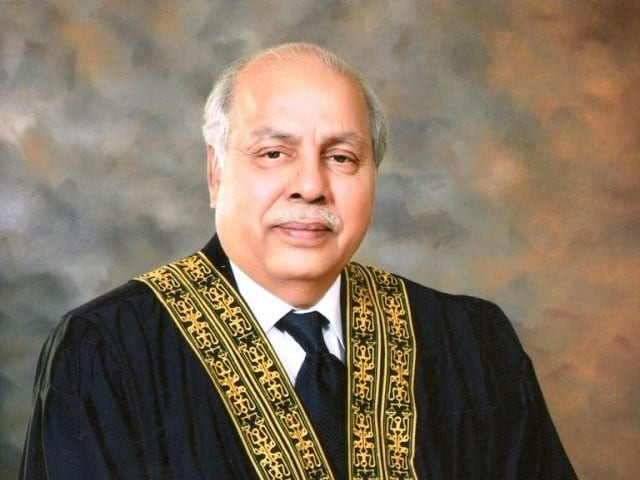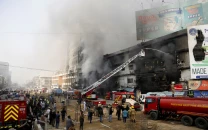Police reshuffle sign of political interference: CJP
Says when police are politicized, one should expect gruesome incidents like motorway rape

The country’s top judge has said the constant reshuffle in Punjab Police reflect politicization of the police, which, according to him, has seriously eroded the law and order situation in country and has started resulting in gruesome incidents like the recent rape of a mother on a motorway.
“The recent reshuffle in the Punjab police is also a sign of a deteriorating policing system and political interference in the police department,” said Chief Justice of Pakistan Gulzar Ahmed on Friday.
In a surprise move, the PTI-led provincial government last Tuesday removed Punjab Inspector-General of Police (IGP) Shoaib Dastgir from his post. Dastagir was replaced by Inam Ghani who is the sixth IGP to head the police department of the country’s biggest province in just two years.
The CJP said policing in the country seemed to be in the hands of unprofessional and inept persons and this situation has seriously eroded the law and order situation of the county.
“When the police are politicized, you should expect gruesome incidents,” the CJP said referring to the horrific gang rape of a woman in front of her children on Lahore-Sialkot motorway on Wednesday night – an incident that shocked the entire nation and triggered countrywide outrage.
The incident set off a debate on mainstream and social media on behavioral tendencies and the alarming rise in the cases of sexual violence in the country as well as the inability of the law enforcement mechanism to provide security to citizens as even a drive on a motorway can prove to be perilous.
“The lives and properties of people are not safe and it is a shame that neither a security system nor a safety mechanism is in place on the highways,” he added.
CJP Ahmed was addressing the closing ceremony of a six-day workshop arranged for commercial and overseas court judges of Punjab. Supreme Court judge Ijazul Ahsan and Lahore High Court Chief Justice Muhammad Qasim Khan were also present on the occasion.
He urged the government to wake up and immediately restore credibility of the police department.
“[This can be done] by allowing police officials to take initiative and decide the issues of the police department themselves and by ensuring that no amount of interference whatsoever is made either by the government or by any political person in the police force”.
The CJP said: “No police force can function as a disciplined, professional force – which guarantees safety of life and property – until it is unshackled from politics and allowed to run as a thoroughly disciplined and professional force responsible for its own conduct.”
Commercial cases
CJP Ahmed said Pakistan is a developing country and its major income comes from the service sector, which is basically a business sector, and such income is also dependent on the agriculture sector. He said a major component of doing business is a contract.
“The contracts are of three forms – oral contract, written contract and implied contract. All these types of contracts are governed by law; in Pakistan, it is the Contract Act of 1872.
“The parties who enter into the contracts are supposed to know their obligations under the contract which they have to meet. Most of the time, the contracts are fulfilled without dispute.
“However, in some contracts, disputes do arise between the parties to the contract. Such disputes, invariably, lead to court proceedings.”
He said the court proceedings, in contract disputes, are of utmost importance for the most basic reason that the parties to the contract rely upon the decision of the courts.
“The contracts, invariably, involve disputes which have monetary issues as well as that of goods or service. The monetary issues and issues of goods and services thus, go into suspense and stagnation until it is decided by the court.
“Here the very functionality of the court and its structuring become very relevant because the contracting parties cannot be kept in suspense for a very long time.”
The CJP said this is where a very dedicated, qualitative and well-structured judicial process is required. This dedicated qualitative and well-structured judicial process can only be achieved where specialized and dedicated courts are created for dealing with the cases of contracts and their disputes.
He said without providing this dedicated, qualitative and well-structured judicial process, Pakistan cannot become a powerful economy nor can economic well-being and betterment of the people be achieved.
“Thus for doing business, the judicial process is like oxygen to the human body, without which there cannot be life. The commercial courts being a dedicated court will have to decide commercial disputes on a fast track basis and shall ensure that such disputes are settled within the shortest possible time.”
He said a simple contractual dispute could be decided within a period of six months while disputes having wider implications, could well be decided within a period of one year from the date of filing.
“I hope that LHC chief with the support of his team and collaboration of the World Bank Groups and the Punjab Planning and Development Department, will be able to achieve the goal of fully dedicated, qualitative and well-structured commercial courts functioning in the province of the Punjab,” he added.
The objective of the training workshop was to improve the efficiency of judges in resolving commercial disputes through court automation and introduction of advanced case management tools.



















COMMENTS
Comments are moderated and generally will be posted if they are on-topic and not abusive.
For more information, please see our Comments FAQ